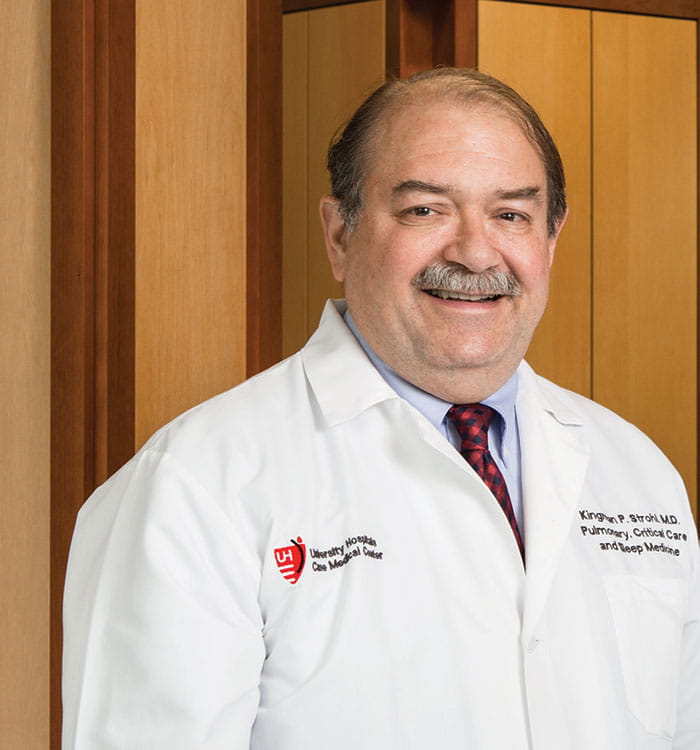Treating Fatigue in Long Haul COVID Patients
July 06, 2022
Innovations in Pulmonology & Sleep Medicine | Summer 2022
COVID-19, and its sequelae, is the defining illness of this decade, says Kingman Strohl, MD, renowned sleep specialist at University Hospitals Cleveland Medical Center.
 Kingman Strohl, MD
Kingman Strohl, MD“At least 15 percent of people who’ve had COVID present with a collection of complaints six or more months after an acute infection of COVID-19, higher in those hospitalized,” he says. “We call this Long-Haul COVID Syndrome, or Post-Acute Sequelae of SARS-CoV-2 infection (PACS).”
University Hospitals COVID Recovery Clinic
Recognizing the need to help patients suffering from fatigue and other long-haul COVID symptoms, University Hospitals Health System, based in Cleveland, Ohio, launched a consultative COVID Recovery Clinic in August 2021 at University Hospitals Ahuja Medical Center in Beachwood, Ohio. It is the only such clinic in the Cleveland market, where the clinical provider evaluating patients serves as the long-term quarterback for the myriad associated health issues these patients face. University Hospitals leadership has plans to develop similar programs throughout its hospital system.
Part of what makes this program unique is that community-based physicians can refer patients if they suspect long-haul COVID syndrome. Once accepted, patients undergo a comprehensive, multidisciplinary evaluation that focuses on the whole patient, not just their symptoms, allowing physicians to refer patients to the appropriate specialists.
“Many other clinics are tied to a specific medical practice, such as neurology or rheumatology,” Dr. Strohl says. “In the UH COVID Recovery Clinic, we have a common intake and then refer patients for therapy based on how they present. The referring physician doesn’t have to pick and choose between specialties.”
Dr. Strohl was awarded a Department of Medicine TEAMS grant to assemble UH providers and investigators from the Department of Physiology and Biophysics (Michael Decker, MD) and the School of Nursing (Stephanie Griggs, MD) for a national grant.
The clinic is led by David Rosenberg, MD, MPH of the Division of Pulmonary, Critical Care and Sleep Medicine at University Hospitals Cleveland Medical Center, and an occupational medical expert, with nurse practitioner oversight for direct patient care. The UH COVID Recovery Clinic has also partnered with University Hospitals Connor Whole Health, its physicians, APPs, licensed practitioners, and the research team of Jeffery Dusek, PhD, to treat and track patient outcomes.
“In addition to standard medical care as needed, 70 percent of patients are referred to UH Connor Whole Health, where they receive whole health therapies such as lifestyle medicine consultations to address nutrition, stress management, sleep, and movement, as well as acupuncture, massage, and mindfulness training,” Dr. Dusek says. “Our goal is to collect initial information and then follow up to determine if patients have resolution of their problem with therapy, resolution with time, or if they have specific resolution of specific symptoms with specific therapy.”
Dr. Strohl says research on long-haul COVID syndrome shows that fatigue is the most common symptom presentation, regardless of the severity of a patient’s initial COVID illness. Fatigue affects 20 to 25 percent of this population, which may represent up to 40,000 individuals in the region served by University Hospitals. The UH COVID Recovery Clinic is also available to those with symptoms such as shortness of breath, dyspnea and cough.
Results from first UH COVID Recovery Clinic patients
“This clinic is a magnet for people with fatigue,” says Dr. Strohl. “Of the first 60 patients seen, fatigue was the primary or co-primary presenting symptom in 70 percent of patients. The other 30 percent presented with an exacerbation of a prior illness, or with pulmonology or neurologic complaints that may have some fatigue component, but fatigue is not their primary or secondary complaint. Another group was reviewed for cardiovascular status, and 10 to 15 percent of them were referred to a cardiologist or neurologist. We also observed that about 30 percent of patients reported brain fog, but not necessarily related to fatigue.”
Identifying sleep disorders is an important part of assessing these patients. In surveys and questionnaires about sleep, Dr. Strohl says 30 to 40 percent of patients reported symptoms related to a sleep disorder, and about 40 percent had a portable sleep test to identify sleep-related breathing disorders. Several patients were diagnosed, primarily with hypersomnolence syndrome and narcolepsy with cataplexy syndrome.
Going forward
“At the present time, we are evaluating what happens when we refer patients and tracking the therapies offered to patients,” says Dr. Strohl. “In addition to standard medical care as needed, 60 to 70 percent of patients are referred to UH Connor Whole Health at UH Ahuja Medical Center, where they receive whole health therapies such as acupuncture, acupressure, massage and mindfulness training. Our goal is to collect initial information and then follow up to determine if patients have resolution of their problem with therapy, resolution with time, or if they have specific resolution of specific symptoms with specific therapy.
“We are curious about fatigue, and we want to distinguish between fatigue and sleepiness in this Long-Haul COVID Clinic. Furthermore, our particular emphasis and sub-focus on sleep is one that has just started emerging in Long-Haul COVID Syndrome.”
To refer a patient, call 216-342-2713, or for more information, contact Dr. Strohl at 216-844-7378.
Contributing Expert:
Kingman Strohl, MD
Division of Pulmonary, Critical Care and Sleep Medicine
University Hospitals Cleveland Medical Center
Professor of Medicine, Physiology & Biophysics and Oncology
Case Western Reserve University School of Medicine


